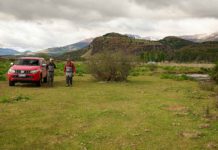While regulations differ by destination, prospective residents should expect to pay an application fee (they range from $94 to $2,000 per person, depending on the country) and provide proof of health insurance, negative coronavirus results from a test taken no more than 72 hours prior to departure, and income or self-employment. All that is a relatively low lift for the chance to surf Bermuda’s Horseshoe Bay on your lunch break or check out Tblisi’s wine scene without taking vacation days. For those who can’t swing extended time out of the country, hotels across the U.S. are introducing packages that are redefining out-of-office. In Miami, for example, the Kimpton Surfcomber Hotel in South Beach is betting on housebound workers eager to answer emails from a poolside cabana where, through the Work From Hotel offer, they’ll have access to high-speed Wi-Fi, office supplies, and unlimited morning coffee. —Sarah Greaves-Gabbadon
A quiet corner of Barbados
Paola + Murray/Gallerystock7. There are places you haven’t been where you already belong
Ghana’s 2019 tourism campaign, Year of Return, encouraged Black Americans like me to come “home.” I was envious as friends and colleagues told me of local people’s embrace and the relief of existing outside the United States’ racially charged bubble. The campaign has since evolved into the 10-year Beyond the Return, and after 2020’s string of wrongful deaths of Black Americans such as George Floyd, Breonna Taylor, and Ahmaud Arbery at the hands of police officers and vigilantes, I hope to experience the journey for myself. I want to feel what it’s like to blend, to belong, and to know my dark-skinned presence won’t prompt fear or violence as it has in America for centuries.
At the popular Makola Market, in central Accra
Matthieu SalvaingArchitecture in Accra’s Osu district
Matthieu SalvaingGetting to Ghana will be easier starting in 2021 with United Airlines’ new nonstop flights from D.C. to Accra. On the ground I’ll have the travel agency R’ajwa Company, owned by a first-generation Ghanaian American, Lady May Hagan, handle the itinerary. I’m sure I will weep upon arrival to the white, hulking Cape Coast Castle, which harbors ghastly secrets of the African slave trade, but I can’t fathom starting my visit without honoring my ancestors there. The rest of my journey will likely be filled with joy and fraternity, whether I’m experiencing R’ajwa Experience’s elaborate Secret African Garden dinner soirées in East Legon, spotting wildlife on game drives from the new eco-resort Safari Valley in the forested Aburi region, gorging on fresh-cooked kelewele (a fried plantain dish) at the lively Osu Night Market, or enjoying sunset cocktails on Sky Bar 25’s rooftop overlooking a twinkling Accra, surrounded by people who look like and welcome me. —Travis Levius
8. Vegas is still Vegas
Visiting Las Vegas requires a certain suspension of disbelief (Paris is not located down the street from Venice, for instance), and you might need to draw on that same magical acceptance to fully grasp what the city is planning next. It has been a challenging and intense time for destinations, especially those designed to bring humans together indoors, but the city has responded in a typically Vegas fashion. Next summer, Resorts World Las Vegas is on track to open its 3,500-room casino and resort on 88 acres across Las Vegas Boulevard from the Wynn. On tap for the property: a speakeasy and a Malaysian-inflected urban food hall, as well as restaurants from boldface names like Major Food Group (whose Parm joins its other Vegas outlets, Sadelle’s and Carbone). Meanwhile, Virgin Hotels is set to welcome guests this month where the Hard Rock Hotel & Casino formerly stood, making over two preexisting restaurants (Nobu and MB Steak) and introducing Hakkasan Group’s Casa Calavera, Nick Mathers’s Kassi Beach Club, and Night + Market, which Angelenos will recognize for its northern Thai street food.
Credit: Source link































